Refugee Boulevard: Making Montreal Home after the Holocaust interviewed child survivors who came to Montreal in the postwar period through either the War Orphans Project, a variety of labour schemes, or family sponsorship. These Web Storytellers share memories about immigrating to Canada and the early and often formative experiences they had in the neighbourhood that is now known as the Mile End and the Plateau. This page will continue to evolve throughout the next year, as more interview clips are added to it. Our hope is that it will provide insight into these refugees’ varied experiences.
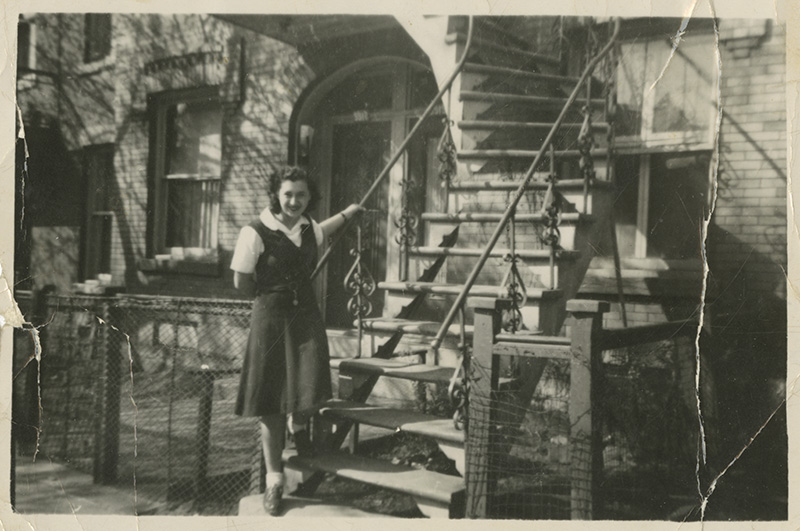
Muguette Szpajer stands before her first Canadian home on Clark Street, 1948. Credit: Muguette Myers
Muguette Myers (née Szpajzer) was born in 1931 in Paris, France. When the war broke out in 1939, Muguette left the city with her school and, a few months later, joined her mother and brother (her father was predeceased) in Champlost, France, where everyone knew that they were Jewish but did not denounce them. The family returned to Paris in 1941 and managed to evade capture on numerous occasions with the help of friends and strangers and by sheer luck. In particular, Muguette narrowly escaped the July 1942 Vel’ d’Hiv Roundup of Parisian Jews by fleeing to Normandy the day before it took place. She and her family were later reunited in Champlost. After liberation, they returned to their Paris apartment and she enrolled in business school. In 1947, Muguette immigrated to Canada with her mother and brother, sponsored by uncles and an aunt from Brantford, Ontario, who were already established there, and settled in Montreal. Muguette returned to her studies for a short period of time before gaining employment in a men’s clothing factory where she met a Canadian-born Jew named Philip Myers. They married in 1951 and had two children. Muguette is a speaker for the Montreal Holocaust Museum and also gives testimony across Canada on behalf of the Azrieli Foundation, which published her memoir about the war years in 2015.
Jewish Canadian Attitudes Towards Survivors
Settling in and Memories of Food
First Friendships in Montreal
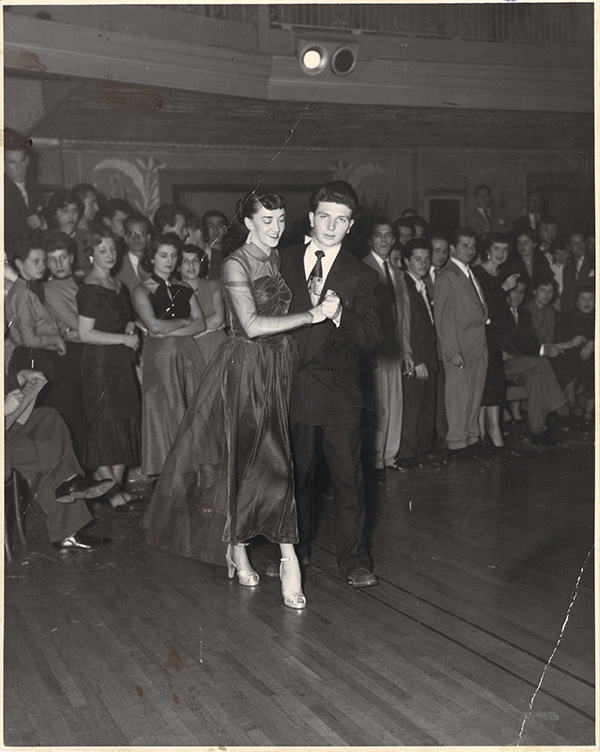
Sidney Zoltak participates in a dance competition at the Palais d’Or, 1951. Credit: Sidney Zoltak
Sidney Zoltak was born in 1931 in Siemiatycze, Poland. His comfortable life ended in 1939 with the Soviet and then German occupations. In August 1942, the Germans established a ghetto in the poorest section of town where the Zoltaks lived with three other families. They escaped through a break in the barbed wire fence in early November 1942. Those who remained were transported to their deaths at Treblinka. From there, Sidney and his family went into hiding and ended up on a farm owned by a Polish Catholic family. They remained there until being liberated by the Soviet Army in July 1944. The Polish family, with whom the Zoltaks remained in contact, was honoured in 2011 as Righteous of The World. Following liberation, Sidney and his parents left Poland, making their way through Eastern Europe to Italy where they lived in numerous displaced persons camps. Following his father’s death in 1945, Sidney and his mother moved to a displaced persons camp in Cremona, Italy, until his mother’s family sponsored their immigration to Canada. They arrived in Montreal in 1948. Sidney ran a successful insurance business and married a Ukrainian survivor, Ann Dickstein, in 1954. Together they had two sons; their eldest tragically passed away in 1973. He is active in Holocaust-related issues, serving as a Board Member of the Claims Conference, Co-Chair of the Remembrance and Yom Hashoah Committees, a speaker for the Montreal Holocaust Museum, and a six-time participant on the March of Living. He also authored a memoir about his experiences during and after the war.
Park Avenue and its Postwar Jewish Community
Socializing in Montreal
The Montreal YMHA and the Jewish Public Library
Dating and Marriage in Montreal
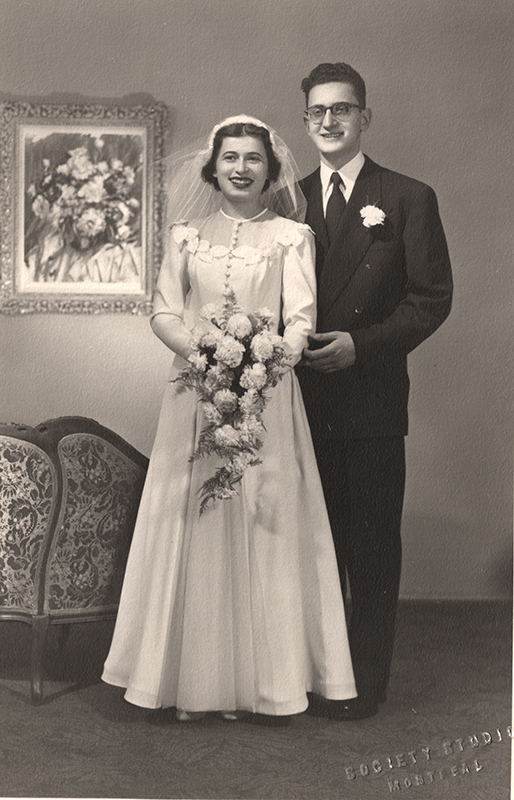
Rena and Mayer Schondorf, 30 December 1952. Credit: Rena Schondorf
Rena Schondorf was born in 1929, in Krakow, Poland. She was 12 when the occupying Germans established the ghetto in Krakow and all the Jews had to move there. Following several waves of deportations, the large ghetto was closed in the summer of 1942, and Rena’s family moved into the small ghetto in Plaszów. There, Rena worked in the Optima textile factory, mending German military sweaters and socks that were sent from the Russian front. As the Soviet army approached in the summer of 1944, the Germans started to liquidate the Plaszów camp. Rena and her mother, Ruth, were transferred first to Auschwitz-Birkenau, Poland, then to Bergen-Belsen, Germany, and finally to the Salzwedel concentration camp in Germany, where they worked in a munitions factory until they were liberated by the American Army in May 1945. They returned to Krakow and stayed there until the beginning of 1946. An uncle who had also survived the war, and was living in Berlin, Germany, smuggled Rena and her mother out of Poland. In the spring of 1947, Rena’s mother sent her to live with a cousin in London, England, where she also went to school. In November 1948, Rena followed her mother, who had immigrated to Canada, and settled in Montreal. Rena married Mayer Schondorf, a fellow survivor from Slovakia, in 1951 and they have two children and many grandchildren. Rena was a speaker for the Montreal Holocaust Museum for many years and was a long time participant on the March of Living.
Money and Work in Montreal
Canadian Attitudes Towards Survivors
Social Life in Montreal
Postwar Religious Views
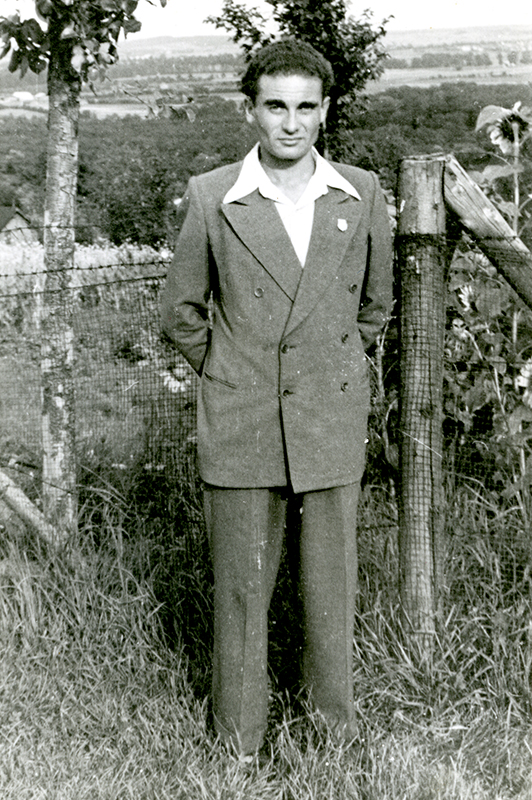
Berel Bokser in Montreal, 1948. Credit: Berel Bokser
Berel Bokser was born in 1925 in Rovno, Poland, to a middle-class, Yiddish-speaking family. After the outbreak of war between the Soviet Union and Germany in June 1941, his father died and the family fled east to various cities in the country before settling in Astrakhan, where they lived and worked in a kolhoz, a communal farm outside of the town. In 1943, Berel relocated to Sverdlovsk, where he lived until the end of the war. After liberation, he made his way to various displaced persons camps in Germany and Poland, eventually reuniting with his mother and sister in Ulm. Here Berel worked as a math and physical education teacher. The family wanted to emigrate to the United States where they had relatives in Boston, but Jews were not allowed into the country. In 1948, a distant cousin sponsored Berel, as well as his mother and sister, enabling them to immigrate to Canada, where they settled in Montreal. Berel found a job in shipping, while also attending night school to complete his university education. He got a BA in Commerce and later a degree in Accounting at McGill University. In 1959, Berel married Frances Rubin. Together they have several children and many grandchildren.
Social life and friends in Montreal
Soccer in Montreal
Postwar Silence about the Holocaust
First Jobs in Montreal
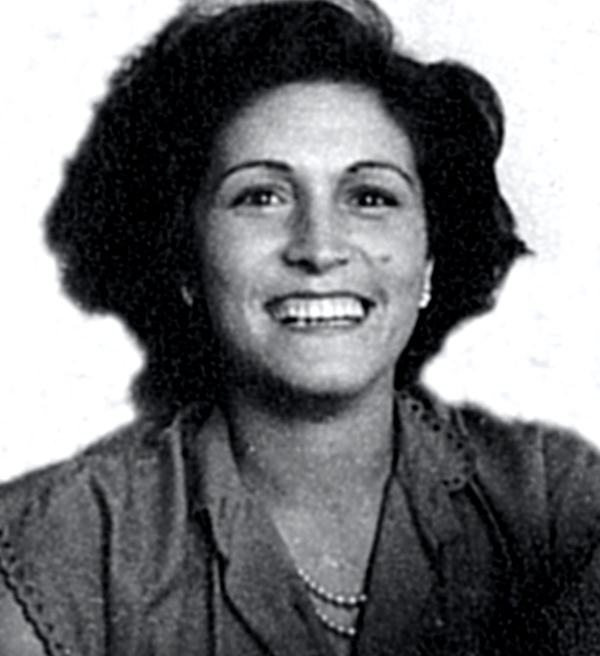
Olga Perlmutter, date unknown. Credit: Joseph Perlmutter, as posted on CBC.ca
Olga Perlmutter was born to a family of eight children in 1919 in Sarospatak, Hungary. Her parents had a large textile business and after finishing high school, Olga worked in the business. The family was deported to Auschwitz in May 1944 and several family members were murdered upon arrival. After liberation, Olga returned to her hometown. She got married and had two sons. Her husband died in 1948, when her younger son was a few months old. Olga and her two sons immigrated to Israel in 1949. Her brother had settled in Montreal and Olga, wanting to be with family, came to Canada in 1951 . In Montreal, Olga married a Hungarian Holocaust survivor who had settled in Venezuela after the war. She worked with her sister-in-law who was a hairdresser and after a while they established their own beauty salon.
Children’s Schooling and Friends
Work in Montreal
Friends and Marriage in Montreal
